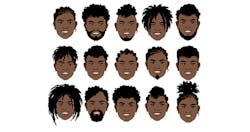Racial Discrimination Bans Extend to Hair Styles
Bans on racial discrimination based on hair styles have been enacted in California and New York, and it is probably only a matter of time before they extend to other states and eventually to the U.S. Equal Employment Opportunity Commission (EEOC).
The issue made headlines last year when a high school wrestler in New Jersey was forced to have his dreadlocks sheared before proceeding with a championship match. The referee advised the wrestler that his dreadlocks were not compliant with regulation and he would either have to instantly cut them off or forfeit the match. The wrestler chose to have his dreadlocks shorn by a trainer and eventually won the match
The wrestler later filed a claim for discrimination and defamation against various individuals and entities. Many people also questioned whether the order to cut his hair resulted from a racial bias against those individuals, in particular black athletes, who wear their hair in natural styles.
On July 3, California enacted a law called the Creating a Respectful and Open Workplace for Natural Hair (CROWN) Act. The legislation expanded the FEHA definition of race to include those “traits historically associated with race, including, but not limited to, hair texture and protective hairstyles such as braids, locks and twists.”
Historically, laws and societal norms equate “blackness” and related physical traits, such as kinky or curly hair, with inferiority and subject black people to unequal treatment, the legislators claimed. The notion of “professionalism” closely relates to “European features and mannerisms,” and that people “who do not naturally fall into Eurocentric norms must alter their appearances, sometimes drastically and permanently, in order to be deemed professional.”
As a result, the new law states, “continuing to enforce a Eurocentric image of professionalism through purportedly race-neutral grooming policies that disparately impact black individuals and exclude them from some workplaces is in direct opposition to equity and opportunity for all.” However, it also says FEHA exceptions for bona fide occupational qualifications, such as health and safety, continue to apply.
The CROWN Act goes into effect on Jan. 1, 2020. To prepare, employers should review and revise current dress code or grooming policies to ensure compliance with the new law, recommends Jasmine Anderson, an attorney with the law firm of Constangy Brooks Smith & Prophete.
Employers also should eliminate language that prohibits hairstyles associated with race, or that suggests only certain hairstyles are permitted in the workplace, she says. “Training employees on the new law, including managers and those employees responsible for making hiring decisions, is critical. Employees should be made aware of the CROWN Act and instructed not to base any hiring or other employment decision on the person’s hair texture or protective hairstyle.”
Although California is the first state to ban natural hair discrimination, New York state followed suit recently after the New York City Commission on Human Rights issued guidance stating that its city laws prohibit discrimination against individuals who wear these kinds of hairstyles.
The city code makes it clear that employers’ grooming and appearance policies may not prohibit hairstyles historically associated with certain racial communities, such as those who identify as “African, African-American, Afro-Caribbean, Afro-Latin or otherwise having African or black ancestry.”
The new state law went further by amending the definition of “race” in the New York State Human Rights Law (NYSHRL) to include “traits historically associated with race, including but not limited to, hair texture and protective hairstyles.” This would include, but is not limited to, hairstyles such as “braids, locks and twists.”
As a result, the NYSHRL now prohibits racial discrimination based on natural hair or hairstyles. In another development, the new state law contemplates the protection of traits historically associated with race other than hair or hairstyles, but which are not clearly identified in the law.
In addition, the state legislature in New Jersey is considering proposed legislation that is similar to California’s new law.
About the Author

David Sparkman
founding editor
David Sparkman is founding editor of ACWI Advance (www.acwi.org), the newsletter of the American Chain of Warehouses Inc. He also heads David Sparkman Consulting, a Washington D.C. area public relations and communications firm. Prior to these he was director of industry relations for the International Warehouse Logistics Association. Sparkman has also been a freelance writer, specializing in logistics and freight transportation. He has served as vice president of communications for the American Moving and Storage Association, director of communications for the National Private Truck Council, and for two decades with American Trucking Associations on its weekly newspaper, Transport Topics.
